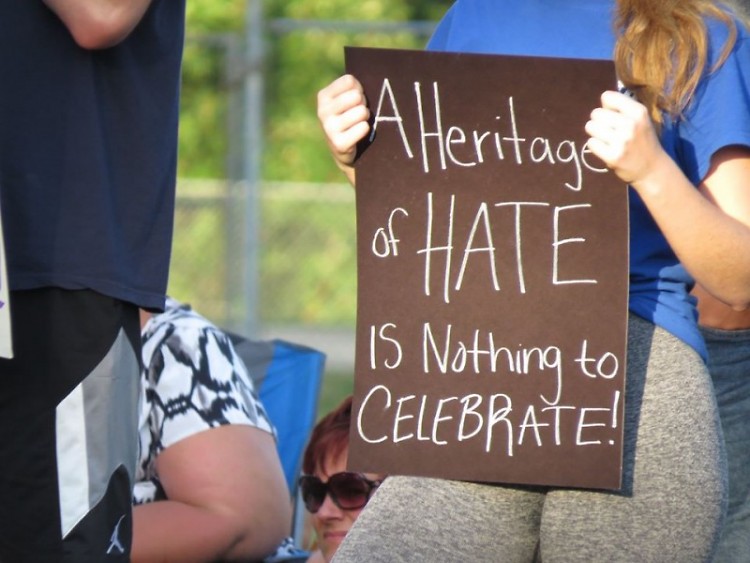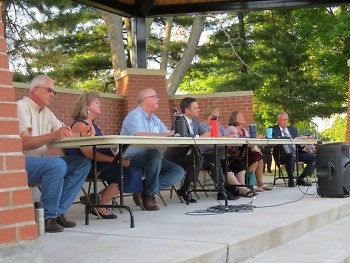I hate small towns.
I understand that’s not a great place to start, given my audience, but it’s important for me to be real. When I moved here for college I expected my stint to be temporary and unattached. Allendale represented everything I hate; homogeneous, bland towns with antiquated values and a strange farm smell that ominously wafts over everything. I’m a senior Global Studies/Political Science major with big dreams of changing the world. In my last three years here, there didn’t seem to be any hope for changing this small town.
Last week I heard about a small group of people calling for the removal of a Confederate statue in Allendale. Its existence confirmed my distaste for this town and I attended their protest eager to dismantle the statue. I didn’t expect to see droves of counter-protestors, guns blazing, and Confederate flags flying. Ryan Kelley, a conservative member of the Allendale Planning Commission, screamed into a megaphone to distract passionate speakers and belittled protestors on his Facebook Live. A Native man was harassed for peacefully saging the area. Armed men stood shoulder to shoulder in front of the statue, ready to defend it with the barrel of a gun. A day that should have been filled with peace and justice met anger and animosity.
The protest energized me, and I arrived at the Allendale Township Board meeting Tuesday night eager to demand justice. The meeting pulled over 100 attendees, mostly those who wanted the statue to be removed. The public forum began after a group prayer (how is that inclusive?) and town Supervisor Adam Elenbaas announcing that “we’re not professionals here.” Though I was alarmed the Board was already trying to skirt responsibility, I was hopeful justice could still be served. Numerous residents delivered passionate speeches on both sides of the argument. One woman was proud of her colorblindness, stating “I don’t even care what color my housekeeper is!” Thankfully, many more eloquently expressed numerous reasons why the statue should go down. Local historians argued that the statue was memorializing a date that’s historically racist. People of color remarked how the statue made their loved ones feel inferior and disenfranchised. College students argued that the statue is a barrier to adding diversity to their schools.
The Allendale Board did not ponder or discuss a single one of these arguments. For the duration of the night, members of the panel shifted from looking terribly bored to uncomfortable. Trustee Bruce Zeinstra had his head in his hand and looked thirty seconds away from a nap. Treasurer David VanderWall was more concerned with shushing residents than listening to their arguments. In fact, I don’t believe VanderWall came with the intention of listening at all. He stated, "the decision is firm" before discussions were complete. Trustee Marcia Hoekstra even declared that “all lives matter” which incensed the crowd. I realized that we were attending a circus and made to be monkeys. The hours we spent drafting our speeches were futile because they fell on deaf ears. Even Supervisor Elenbaas, the most vocal Board member on the issue, seemed to be more concerned with political optics than substance. Are our elected officials more concerned with looking good than listening to the people?
Unsurprisingly, the Board voted to keep the statue up. They resolved to form a “diverse” committee to present the Board with future options to change the Garden of Honor. Treasurer David VanderWall made it clear that “the decision is firm” but “we can hope.” The majority of the crowd was enraged at the lackluster attempt to settle the issue and made their thoughts known. Several speakers called Board members out directly for their incompetence, including myself. I wouldn’t have made that remark about Bruce Zeinstra being sleepy if I wasn’t willing to tell him directly.
If you’d asked me right after the Board’s decision, I’d say there really is no hope in a small town. However, I looked around and saw what was really happening: we won. A couple of college girls with no organizing experience created a local movement. Families who have felt shunned by their neighbors now have an inclusive community. Our group is sharing resources, building unity, and working to do much more than removing a statue. We won’t rest until every Board member is held accountable and eventually replaced with someone who is confident in their ability to do their job with integrity and empathy. Personally, I won’t rest until I see planning commissioner Ryan Kelley’s resignation letter.
So yes, you can find hope in a small town. The heart of a town is in its people, and I have seen immense courage from those standing with me. I thought small towns couldn’t change, but I was wrong. They already are.
The Rapidian, a program of the 501(c)3 nonprofit Community Media Center, relies on the community’s support to help cover the cost of training reporters and publishing content.
We need your help.
If each of our readers and content creators who values this community platform help support its creation and maintenance, The Rapidian can continue to educate and facilitate a conversation around issues for years to come.
Please support The Rapidian and make a contribution today.


